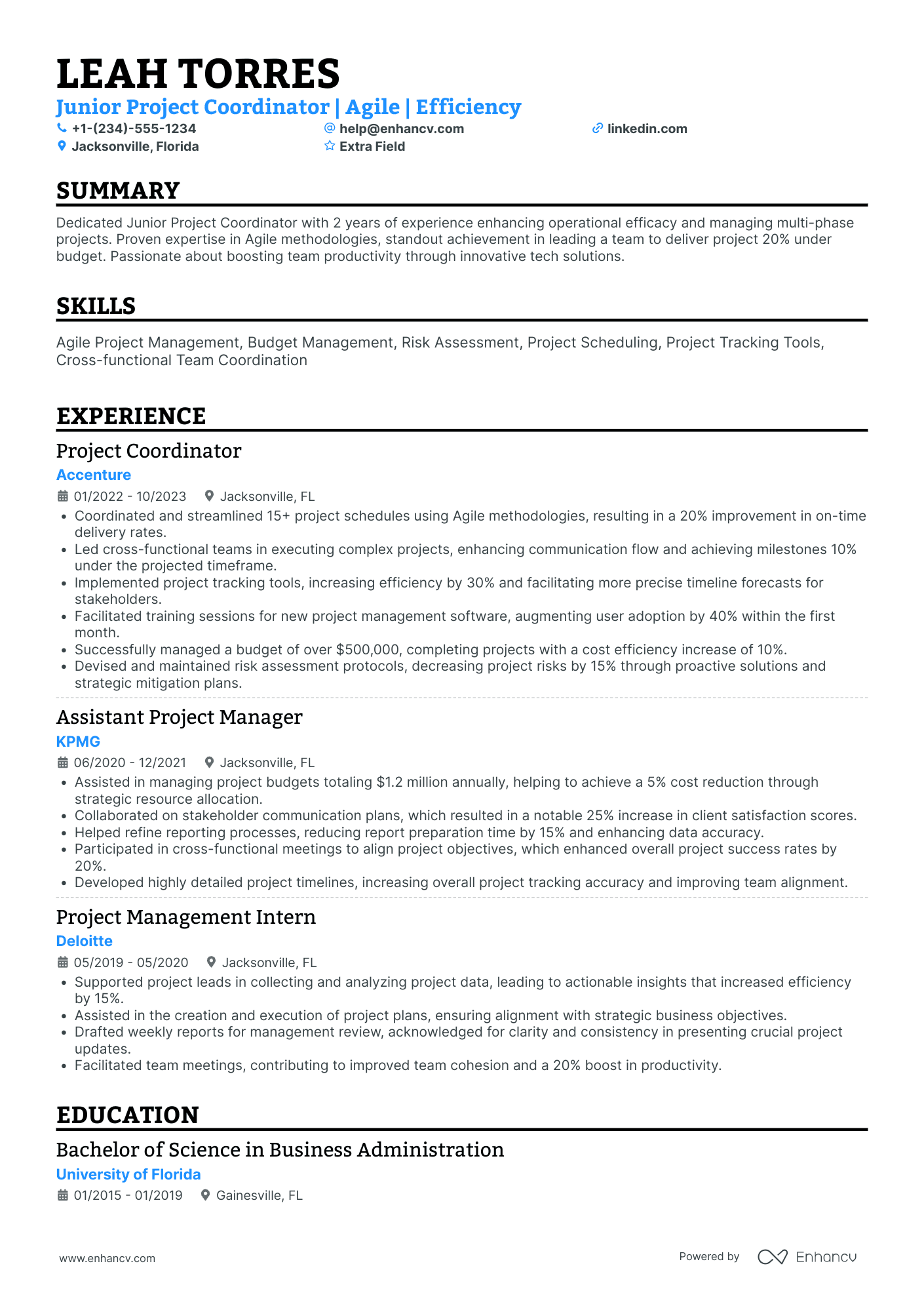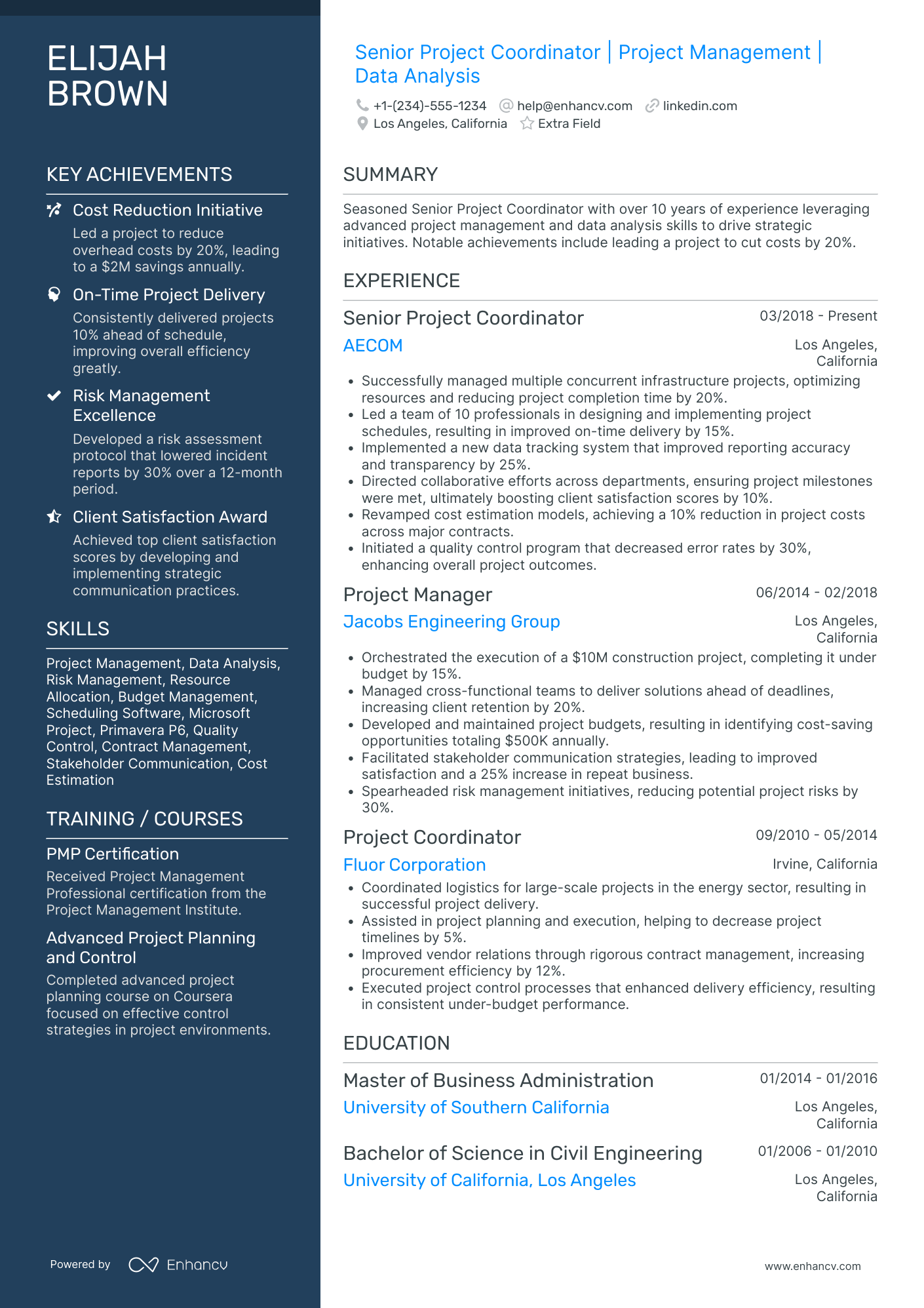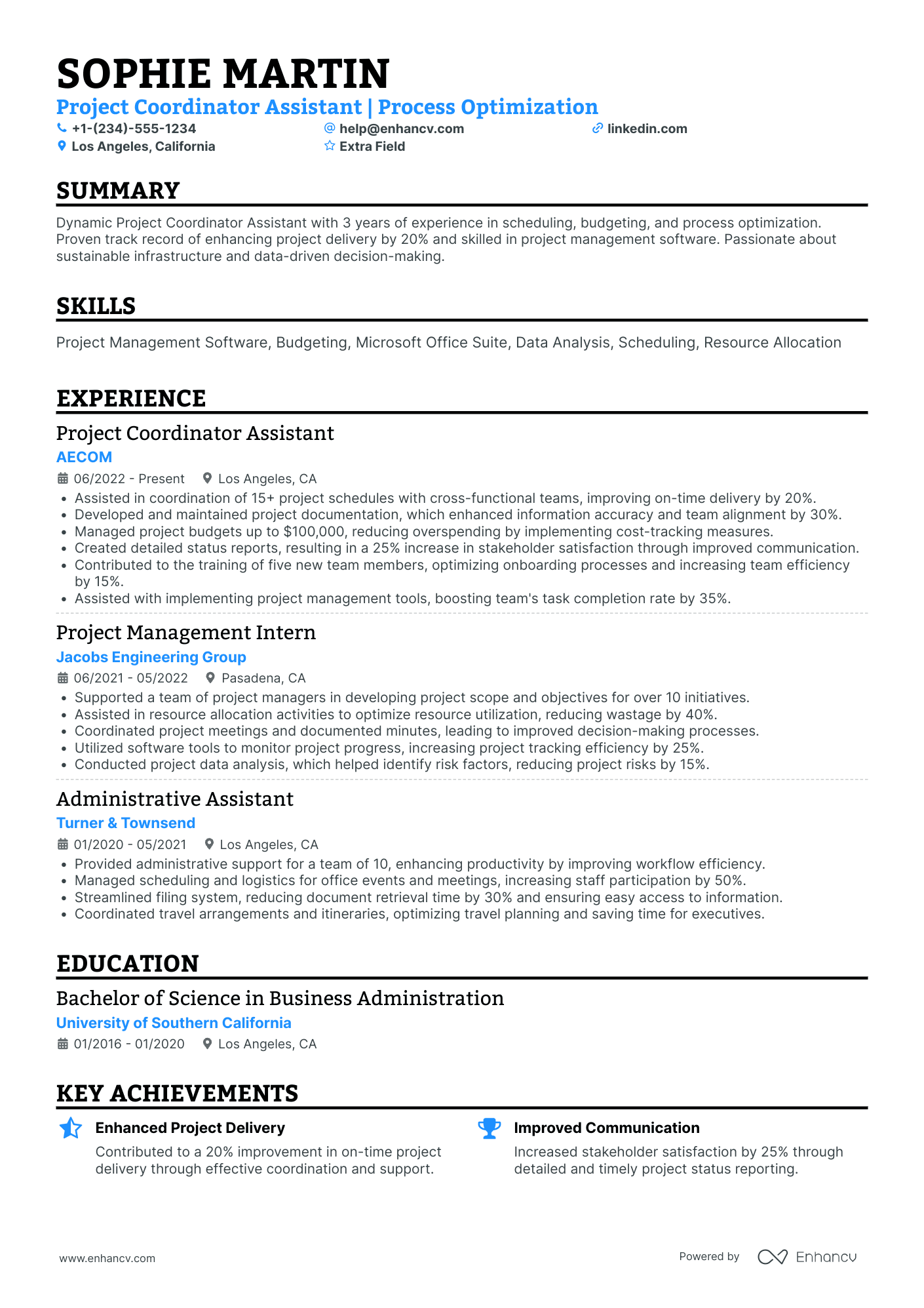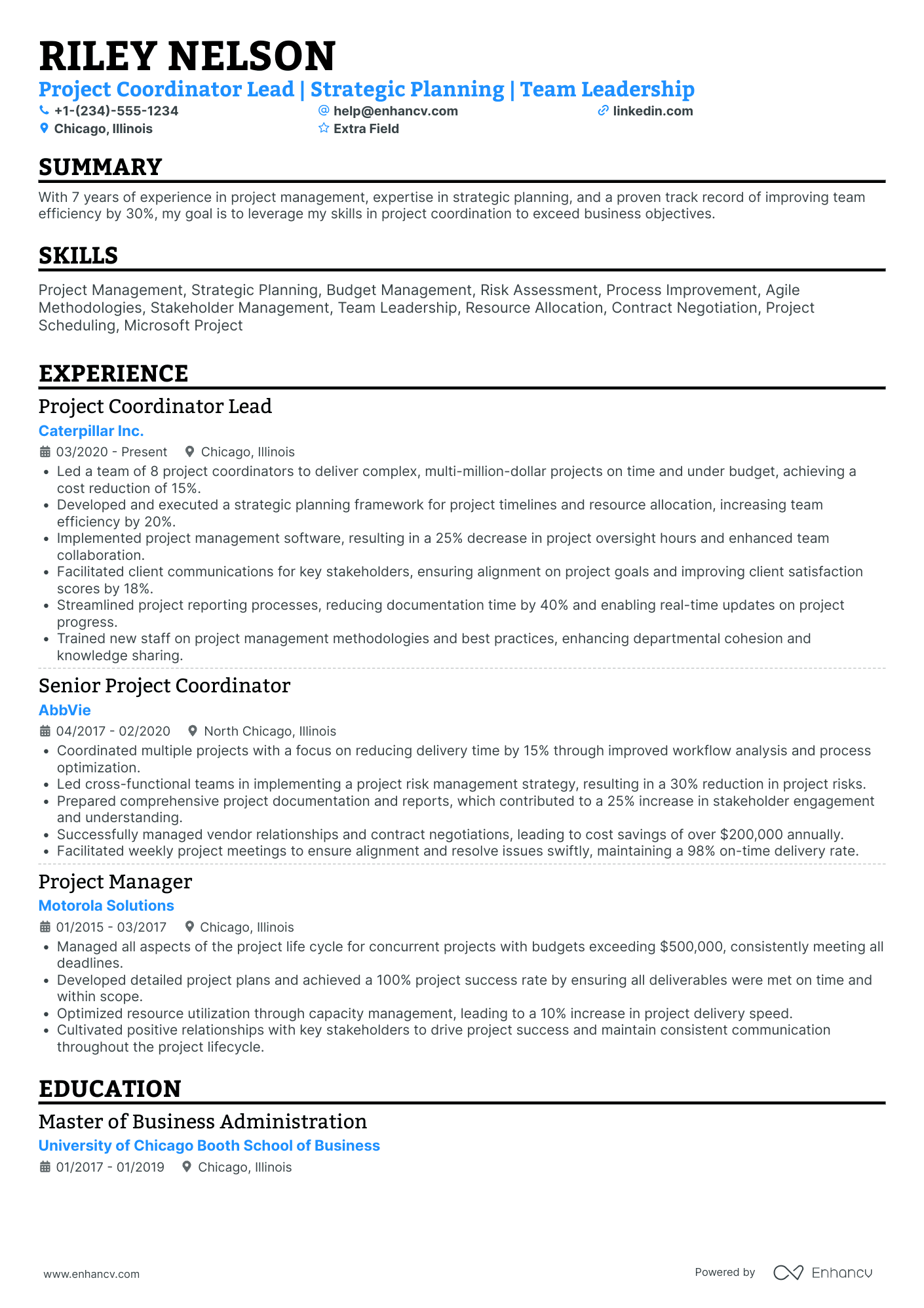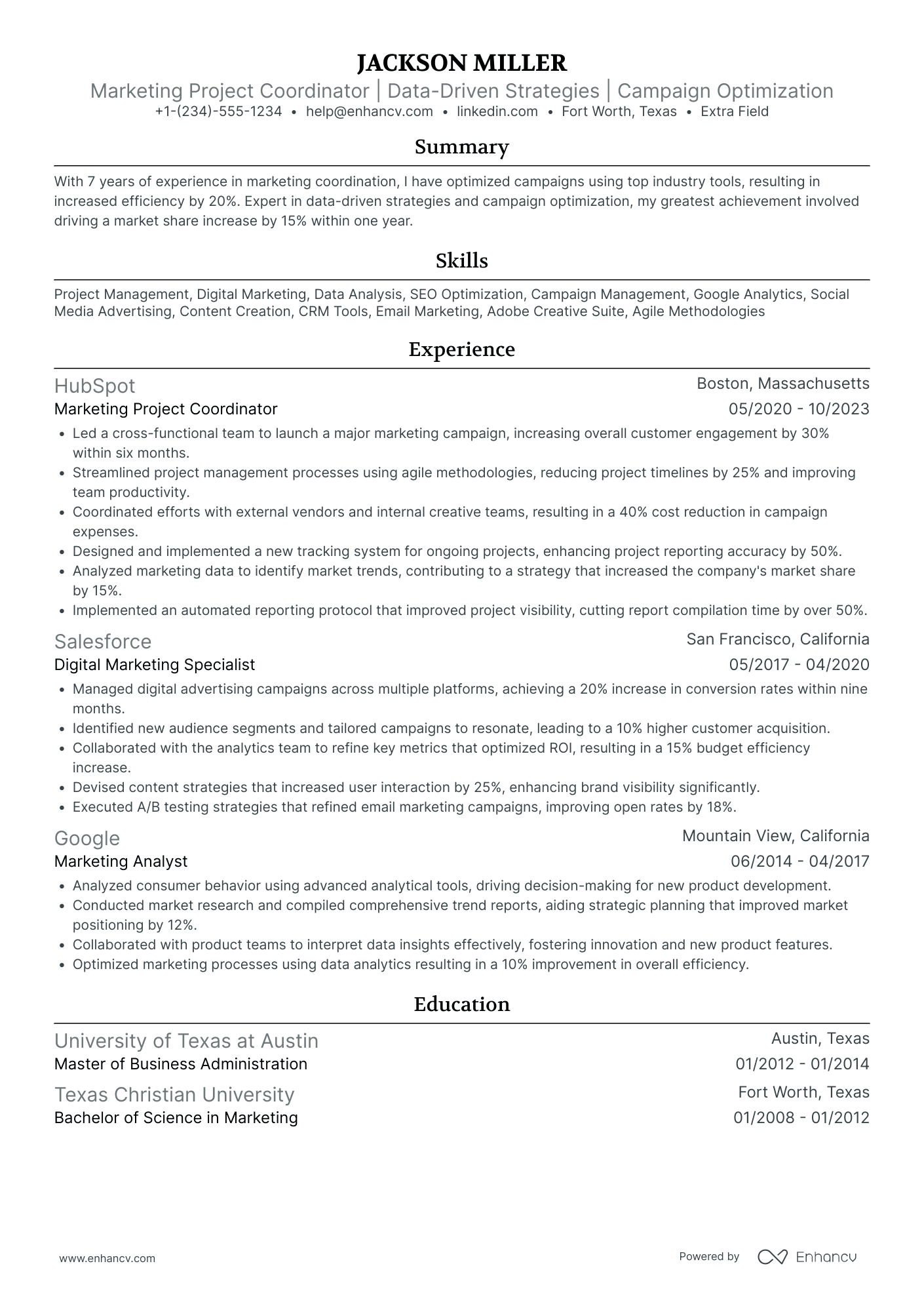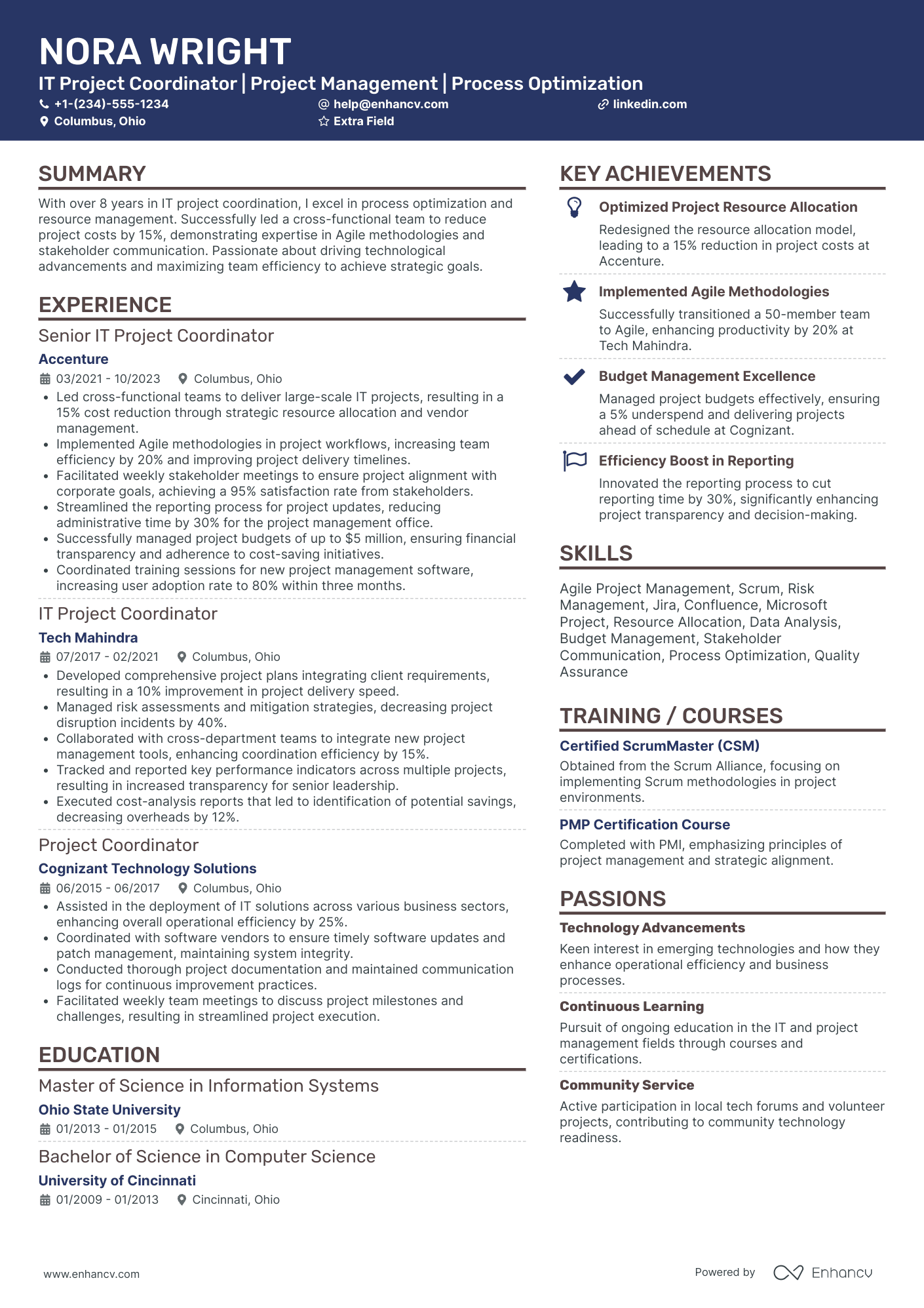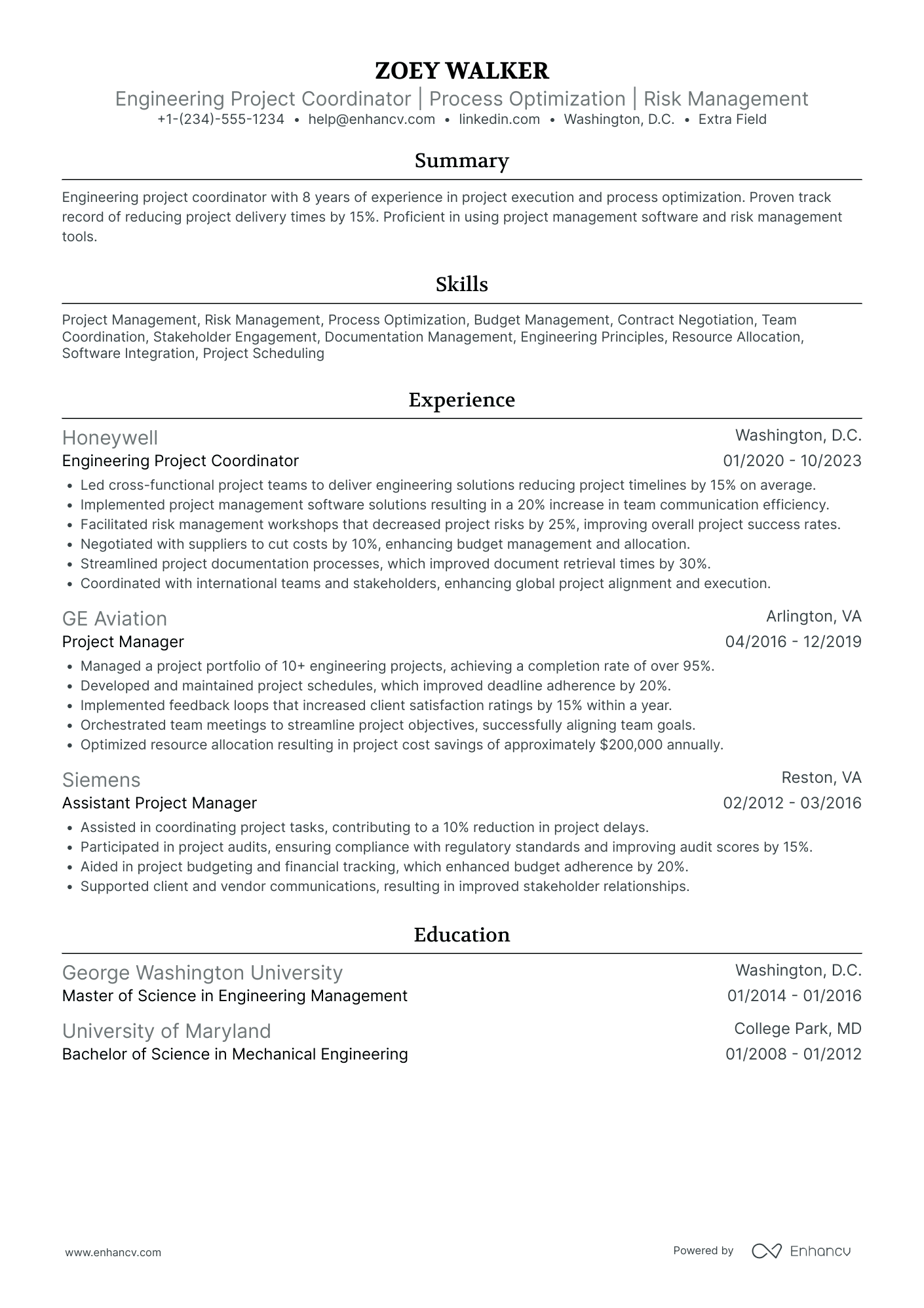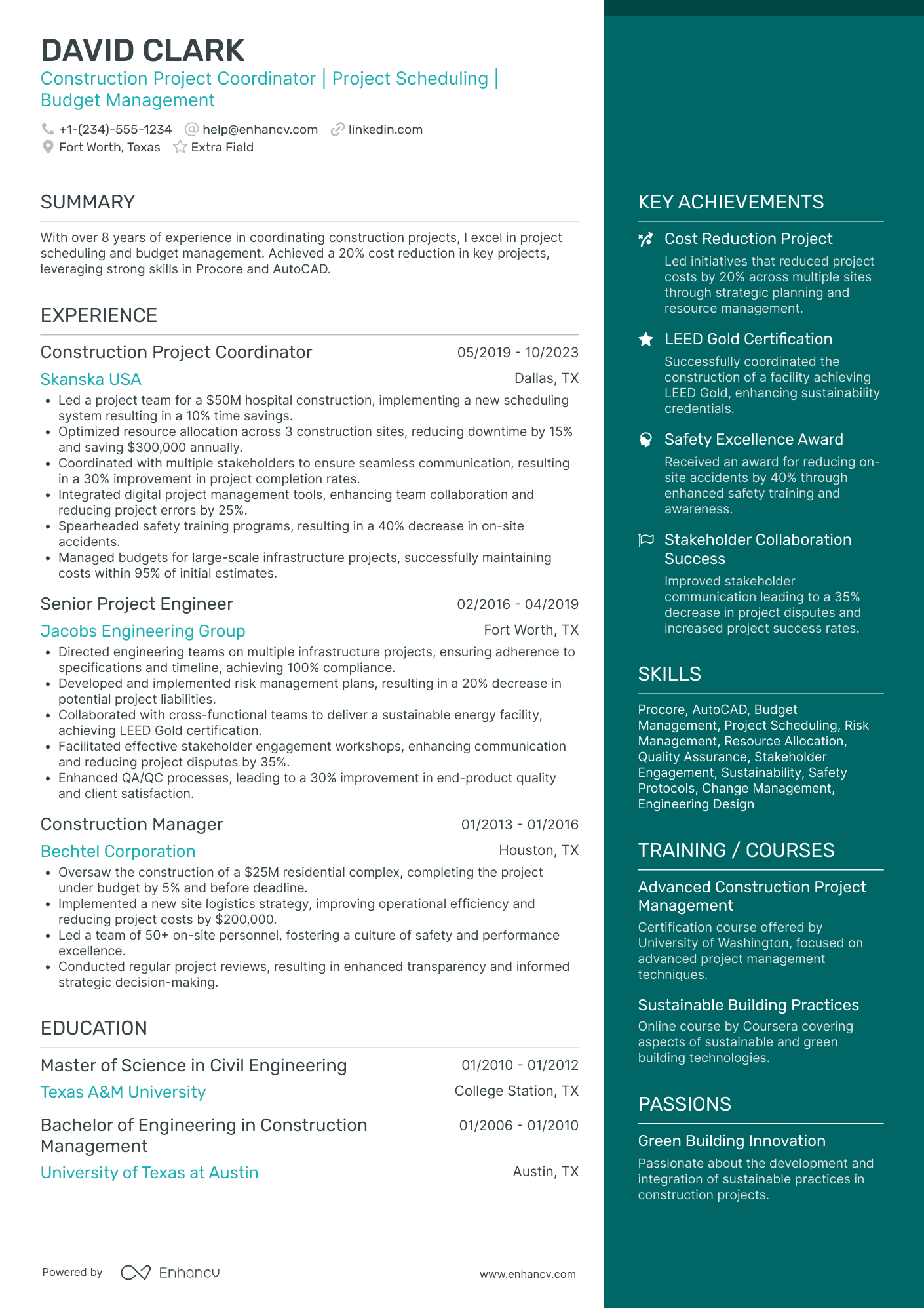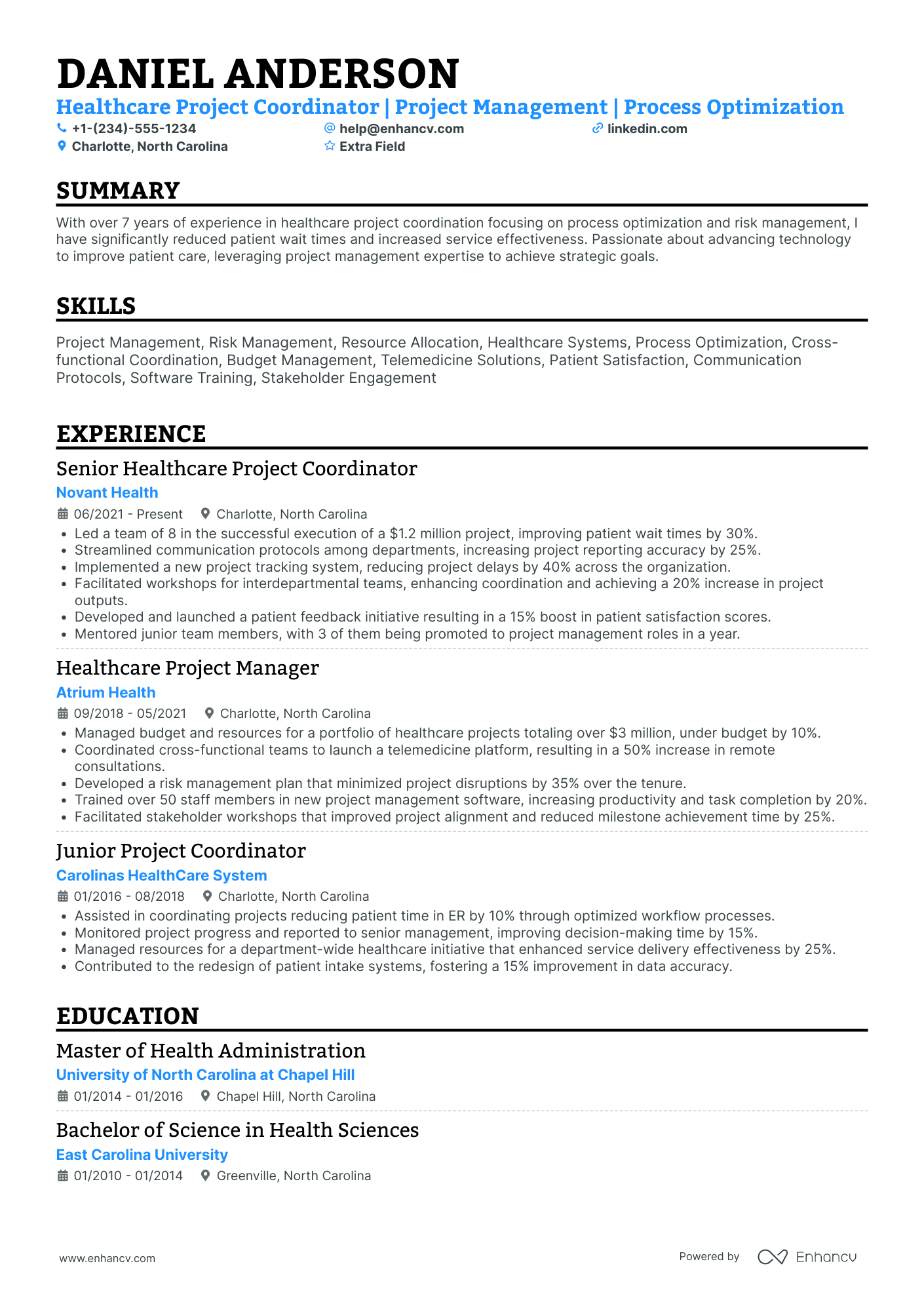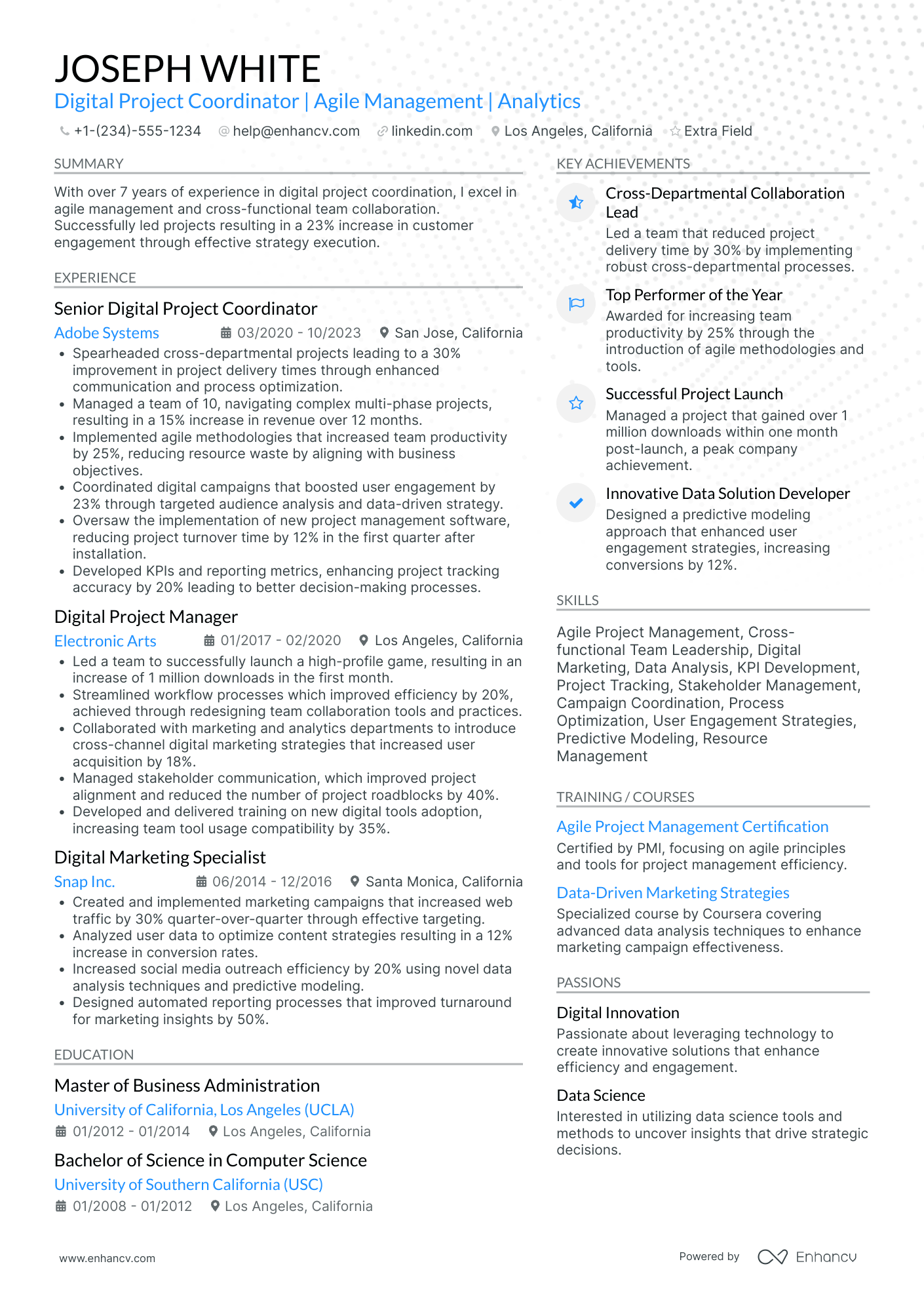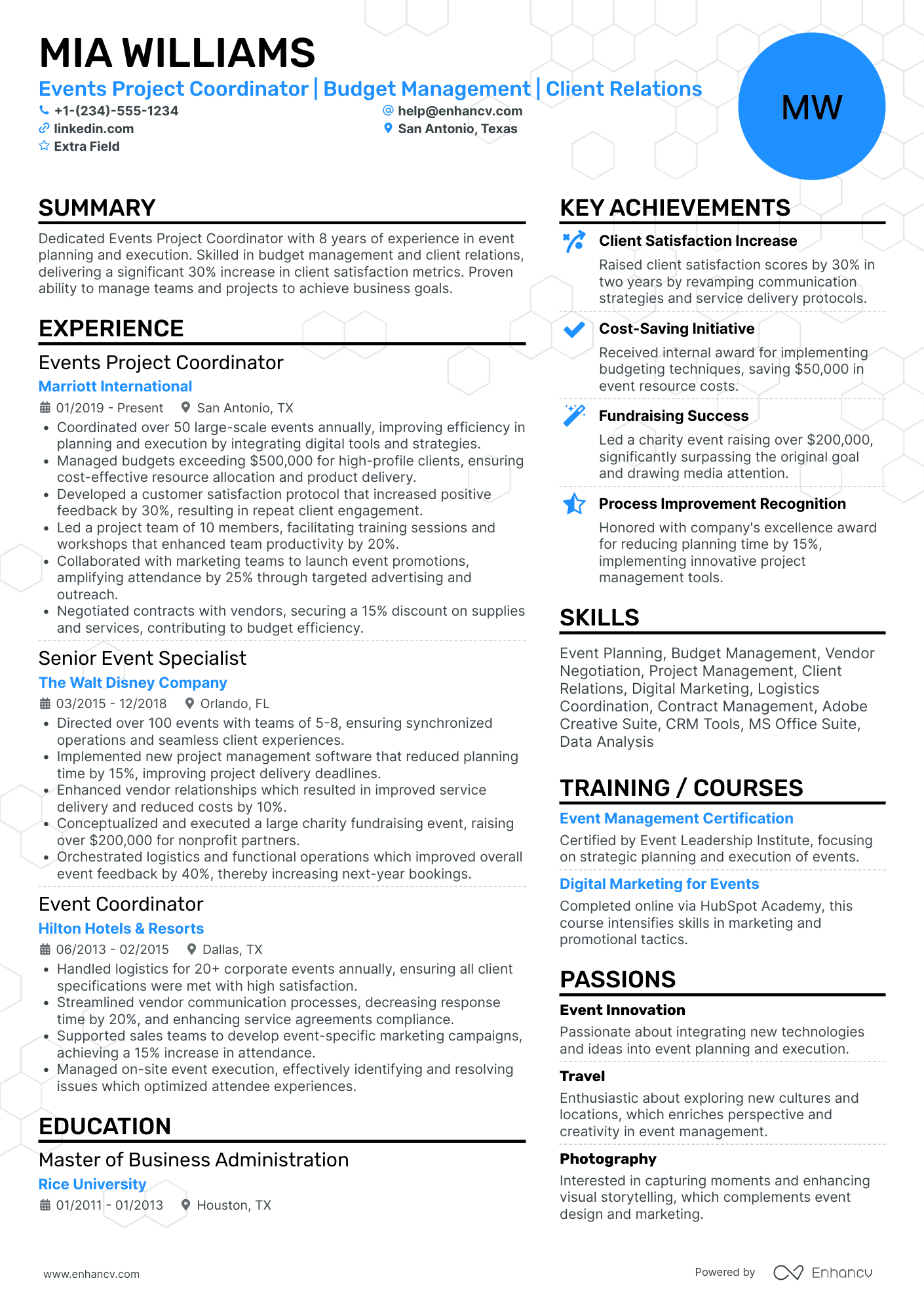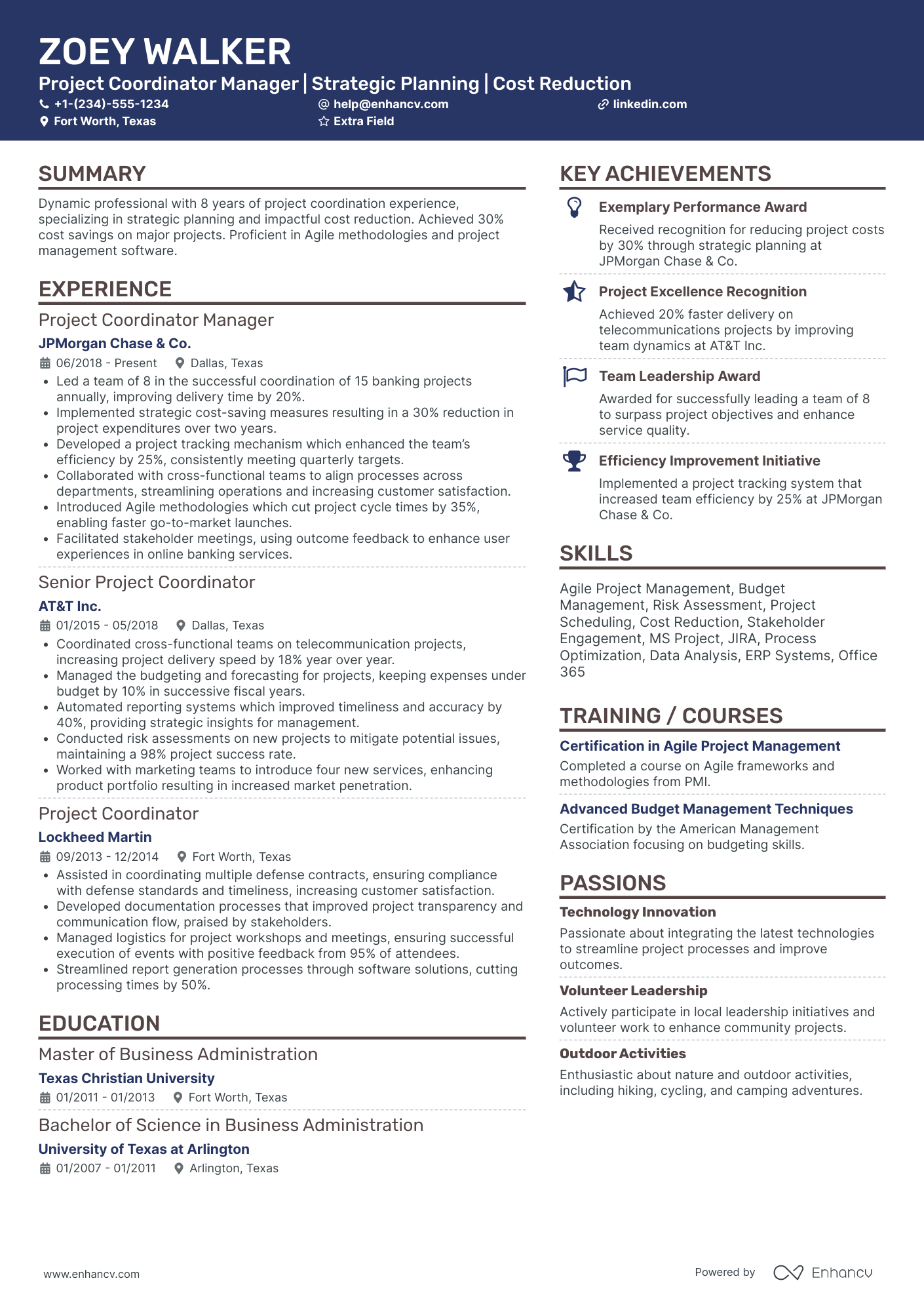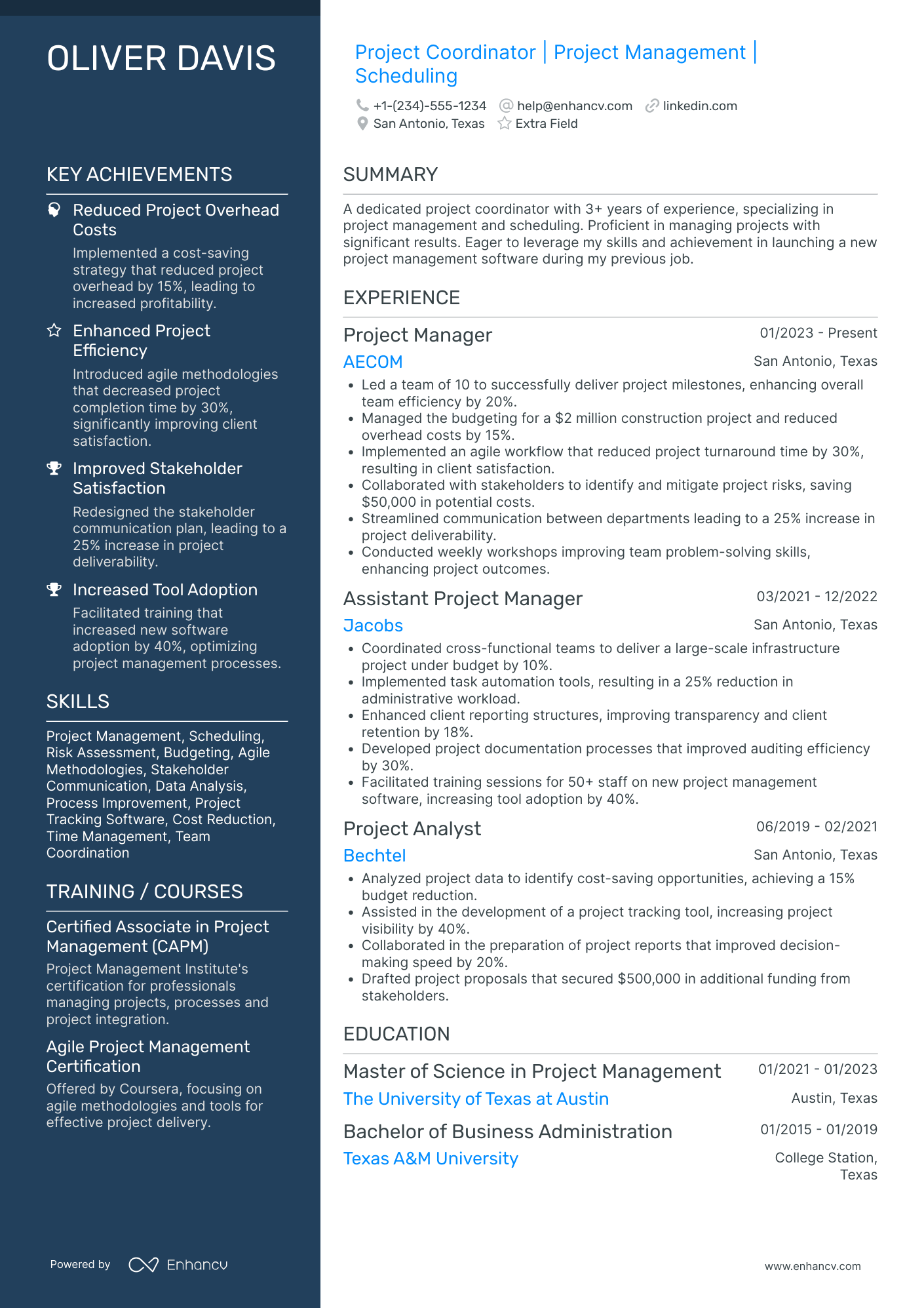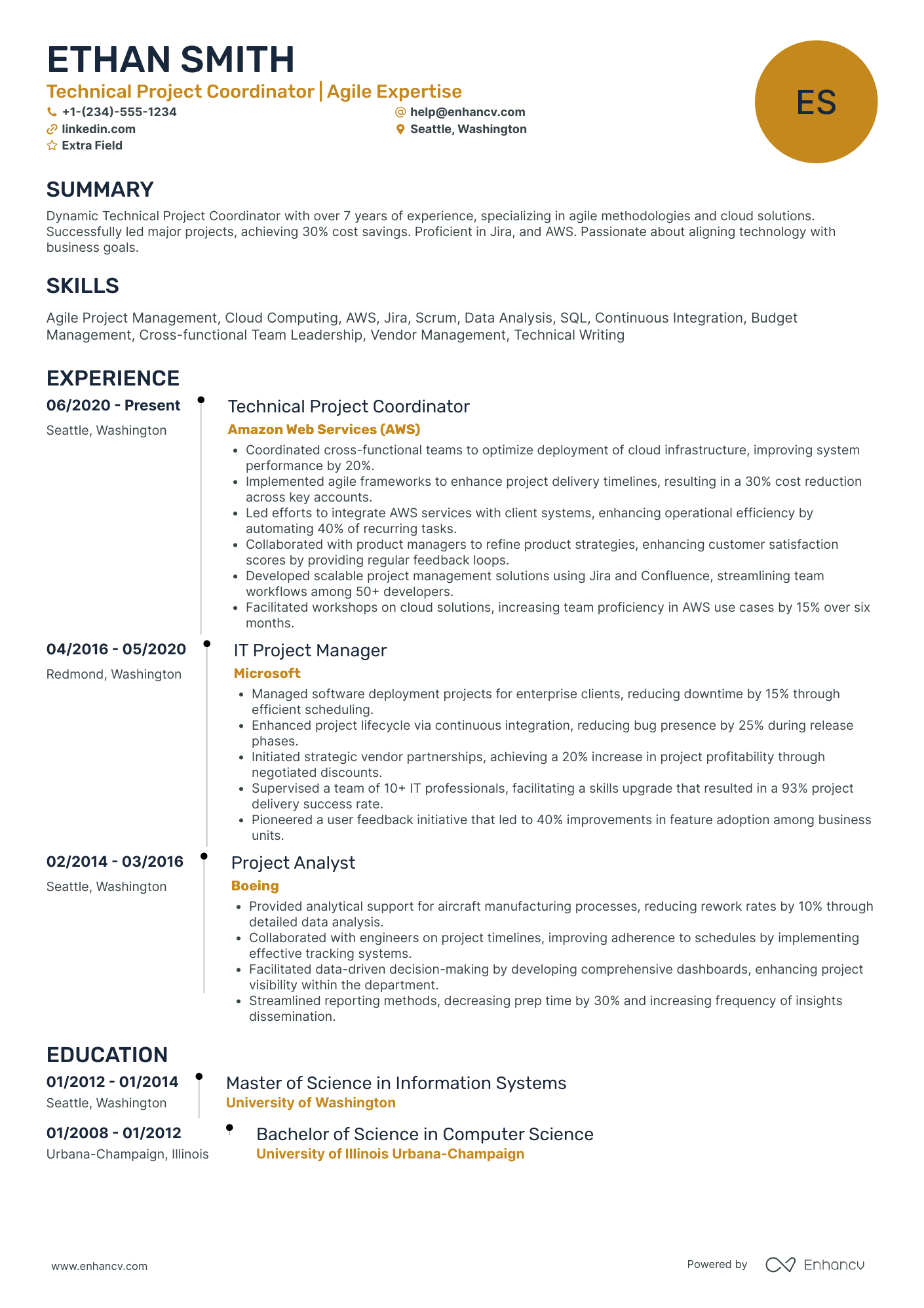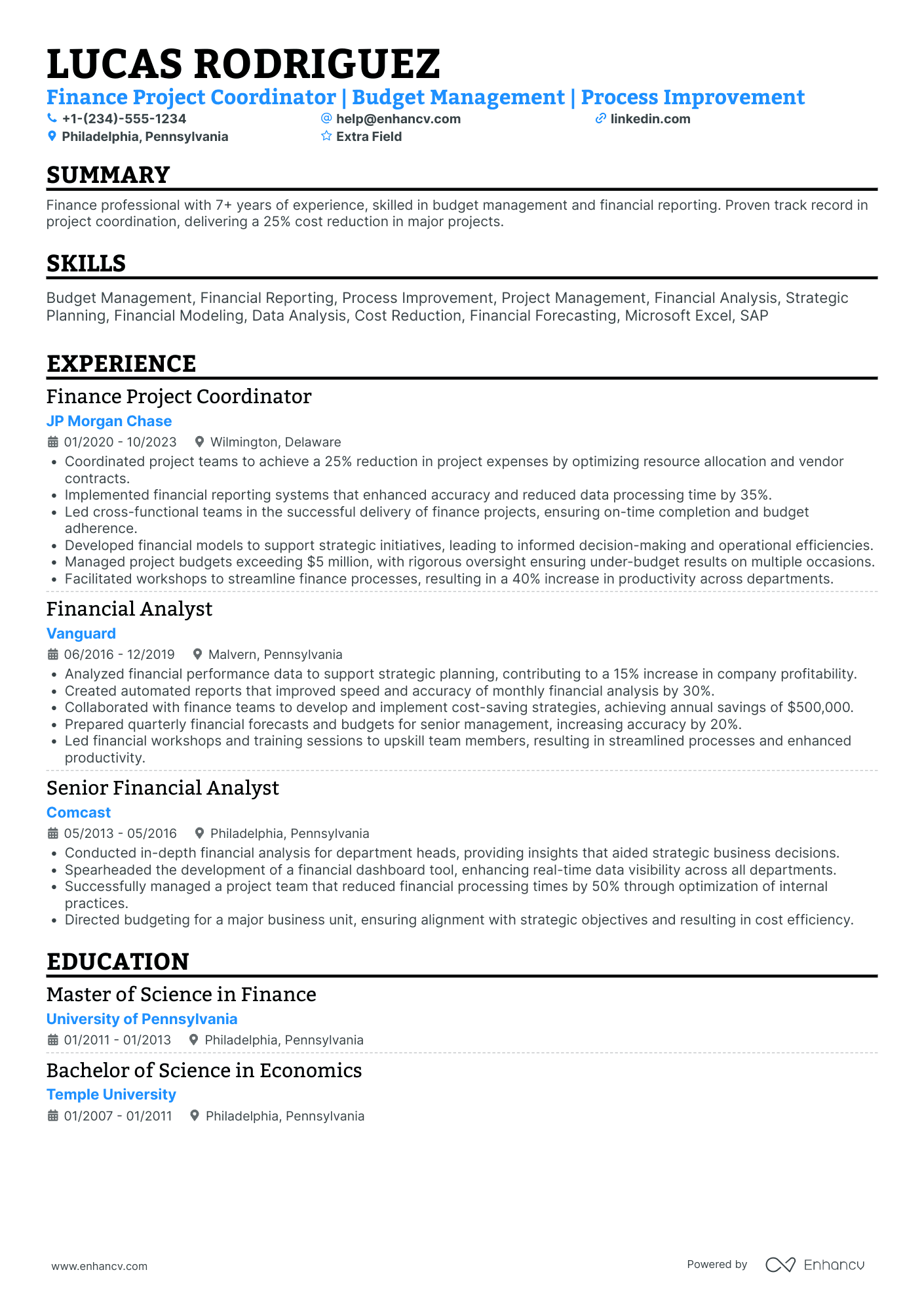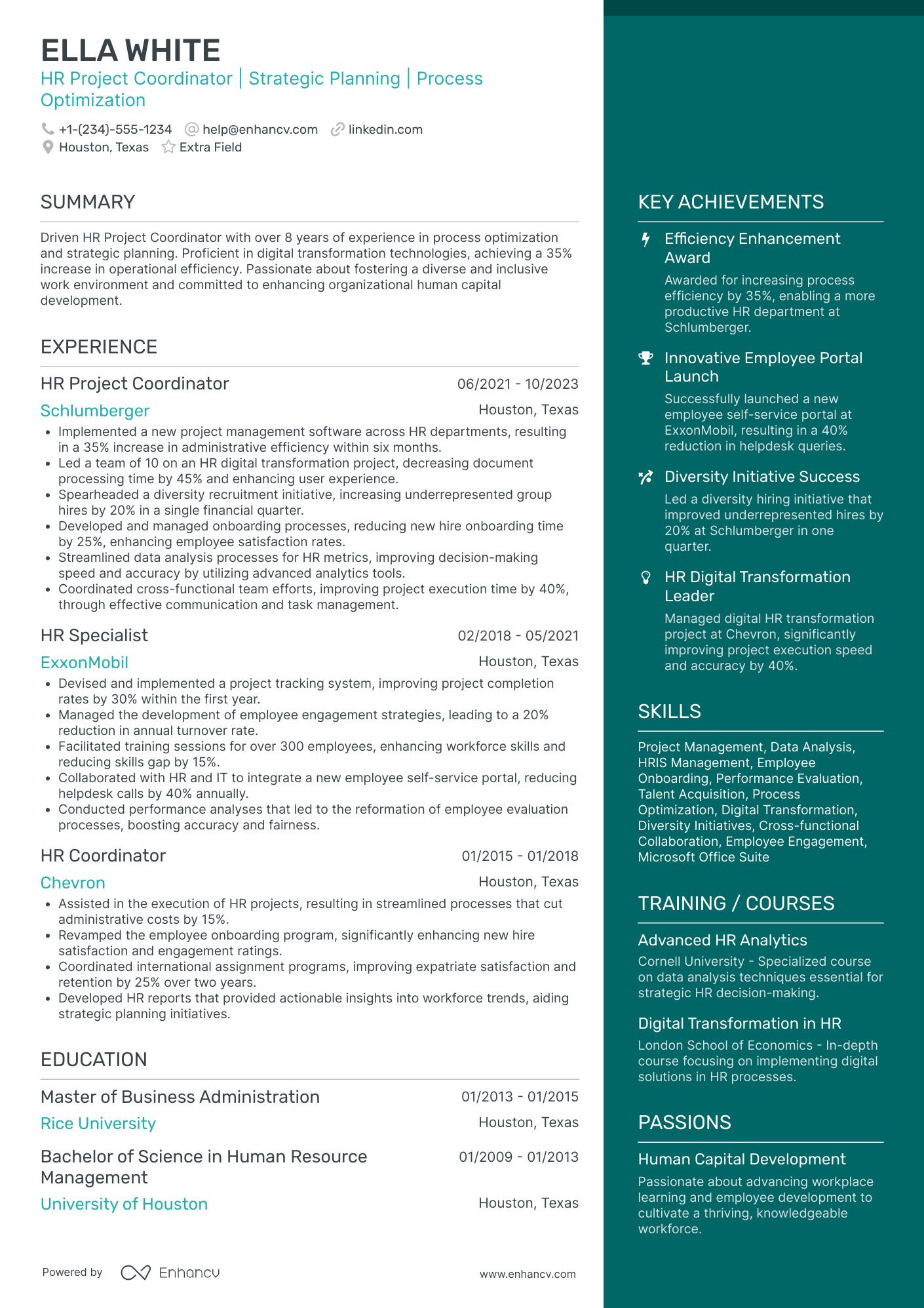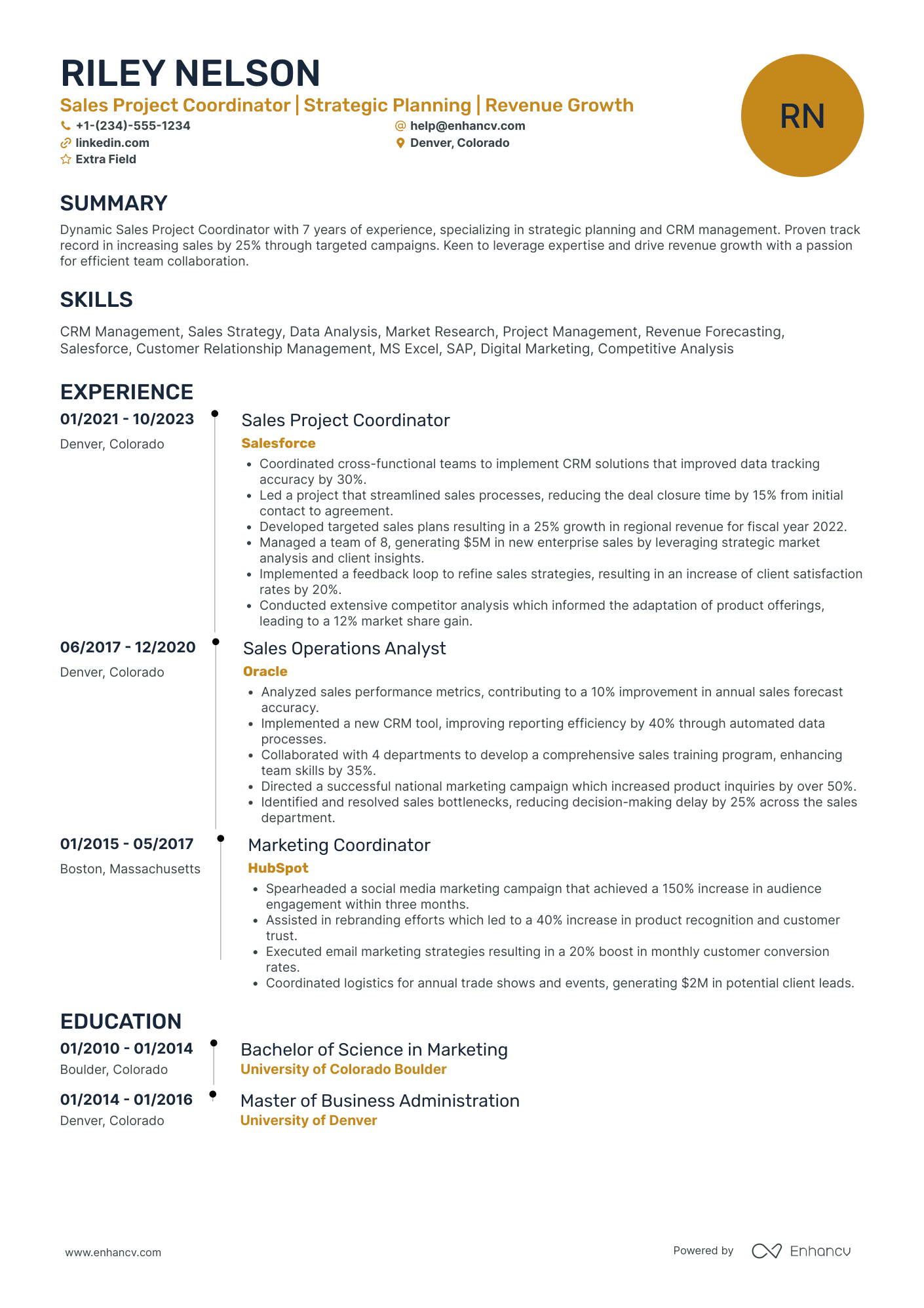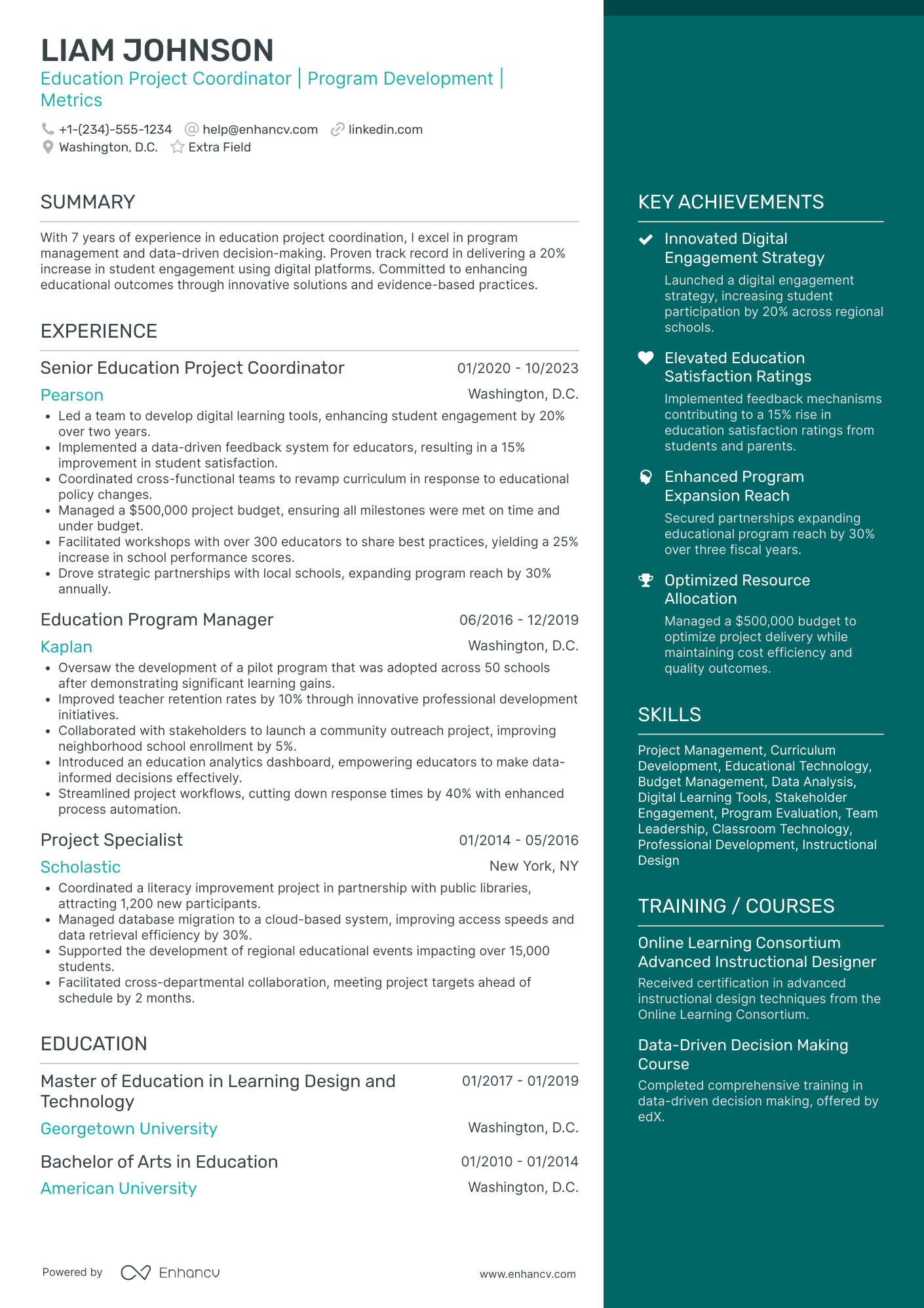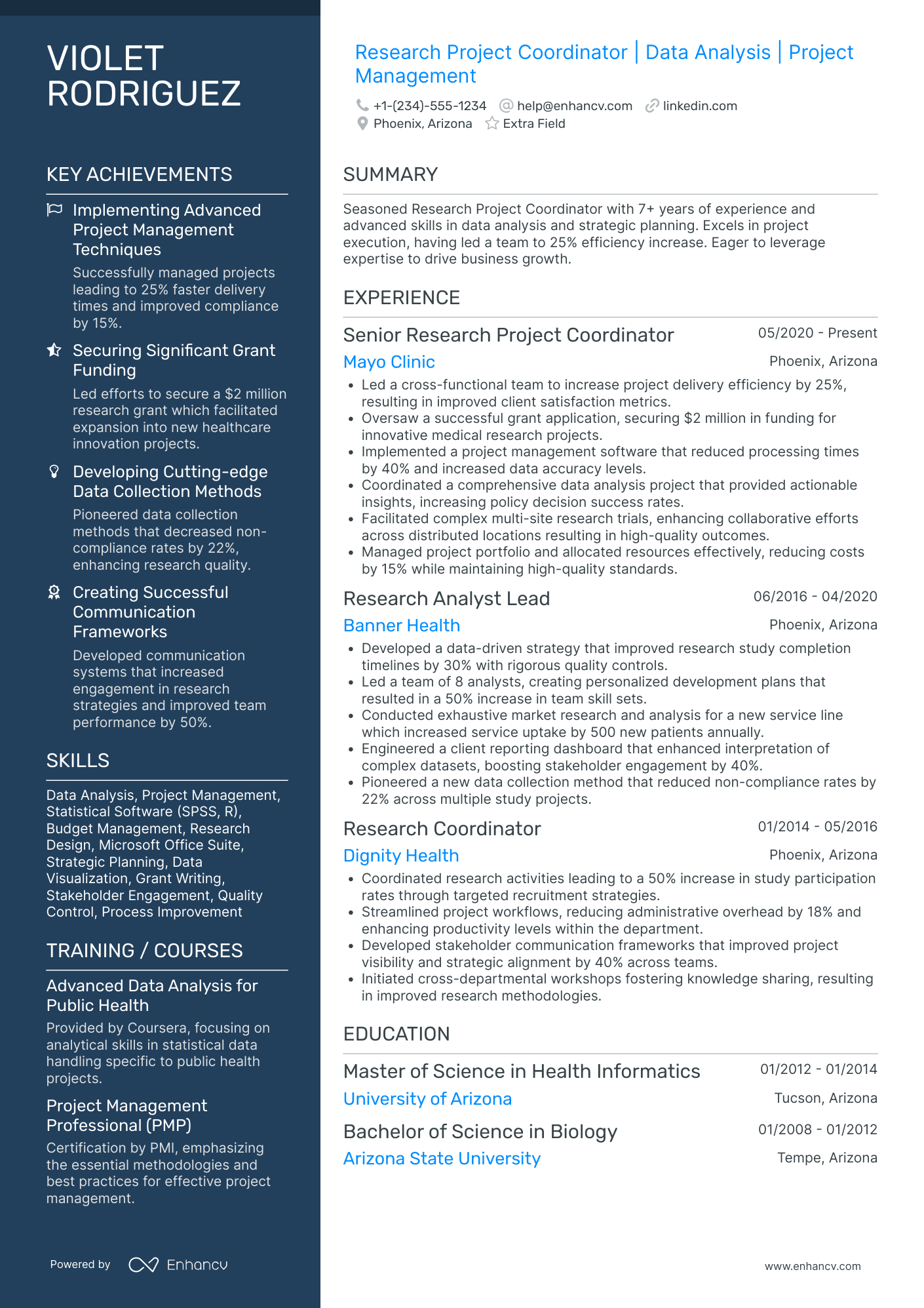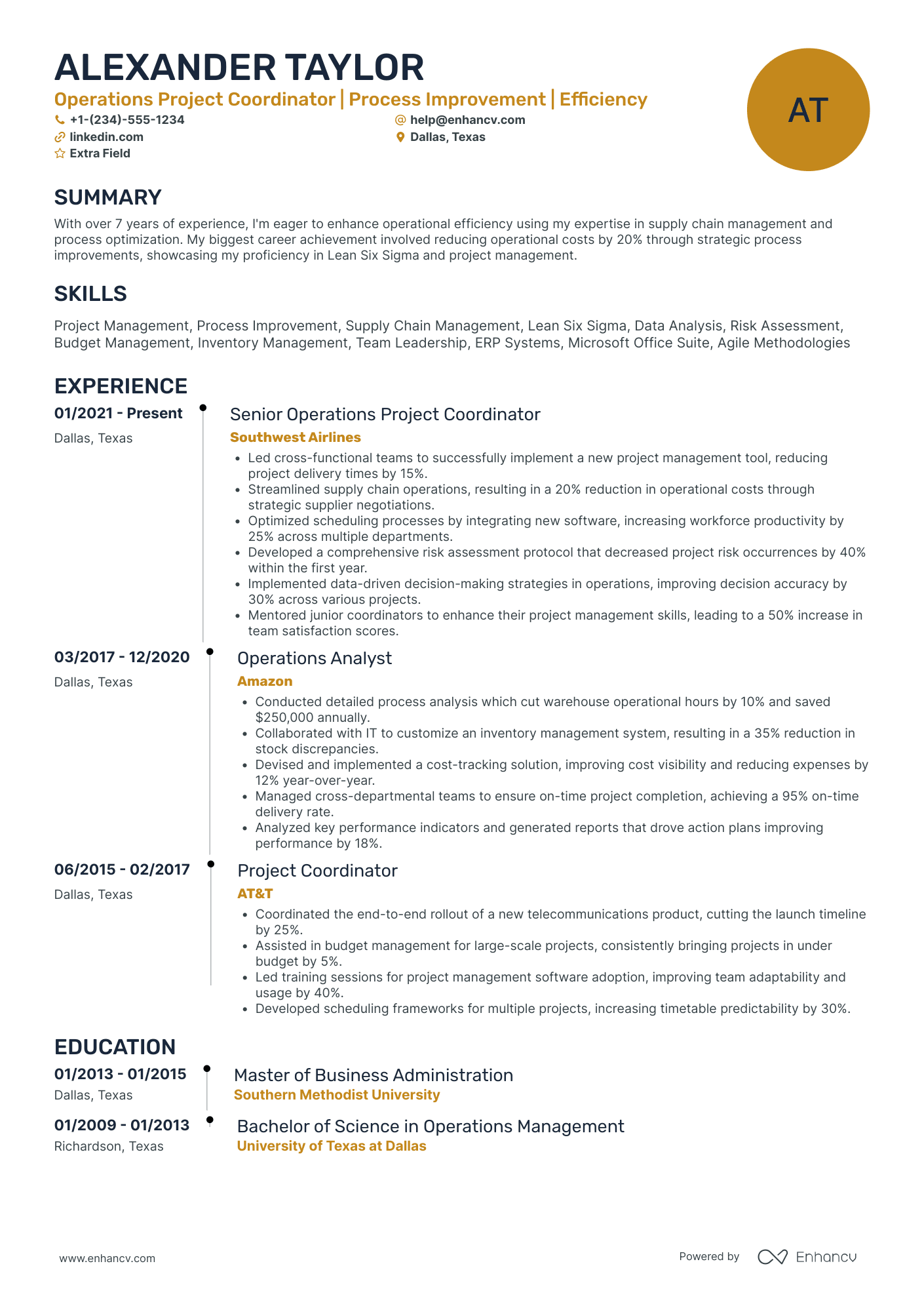Like the conductor of an orchestra, a project coordinator is a leader. They are the singular point each team and individual looks to for direction. A project coordinator must know what is happening, provide actionable feedback, and keep everyone informed about what comes next.
Translating these artful skills into your project coordinator resume requires an understanding of resume writing best practices and what employers value in project coordinator resumes. Examples include your ability to juggle multiple tasks and communicate effectively, proficiency with project management software, and skills in budget management and team coordination.
Whether you're an experienced coordinator aiming to elevate your career or a newcomer eager to showcase your organizational prowess, your resume is your first and best chance to impress potential employers. It's not just a document. It's a stepping stone to your professional growth and success.
This guide, including pro tips and examples, will help you craft a resume that not only captures attention but also opens doors to exciting opportunities in the project management field, transforming your professional experiences into a compelling narrative.
For further resume-writing guidance, check out the following industry-specific project management guides:
- Project coordinator cover letter
- Project director resume
- Senior project manager resume
- Technical project manager resume
- Project engineer resume
- Agile project manager resume
- Project manager resume
- IT project manager resume
How to format a project coordinator resume
No matter the industry—IT, construction, marketing, or healthcare—hiring managers are looking for organized, capable project coordinators. A well-formatted resume demonstrating professionalism and other highly valued skills for project coordinators, such as attention to detail, organizational skills, high standards, and effective communication, will stand out to employers.
A professionally formatted resume conveys a sense of credibility and seriousness about your job application. It shows that you understand and respect the norms of the professional world.
Follow these tips to ensure your resume impresses hiring managers and leaves them wanting to know more:
- Keep it simple. To maintain a sleek, professional appearance, avoid using unnecessary creative elements that may distract from your qualifications.
- Be concise. Aim for a one-page resume and use bullet points rather than paragraphs when possible to describe experiences and achievements, making it easier to skim.
- Use clear headings. Ensure your resume sections are organized logically and differentiated using simple, precise headings. Bold headings to help organize information and guide the reader's eye.
- Include contact information. A prominent header featuring your name, desired job title, and contact information lets employers view them at a glance.
- Proofread: Finally, proofread your resume multiple times for spelling, grammar, or formatting errors. Consider having someone else review it as well to catch anything you might have missed.
- Maintain proper ordering: List all entries in reverse chronological order to ensure your most recent and relevant appear first.
An essential formatting element you may or may not be aware of is ATS (applicant tracking systems). ATS analyzes resume text for keywords and phrases corresponding to desired skills and qualifications for a specific job. Employers use these systems to quickly sort resumes and prioritize candidates with qualifications closely aligned to the available position.
Here are a few tips to ensure your formatting is ATS-optimized:
- Fonts: Select ATS-friendly fonts matching the overall style of your resume. Some ATS-friendly fonts are Calibri, Arial, and Times New Roman. However, these commonly used fonts can be dull or generic. For more creative font options, try Rubik, Lato, Montserrat, Raleway, Exo 2, and Volkhov, which are all available on the Enhancv Resume Builder.
- Document type: Doc or PDF files are typical for resumes and most easily analyzed by ATS. We prefer PDFs, as they maintain your formatting across different operation systems.
- Headings and subheadings: Ensure resume sections are logically organized and include simple, precise headings. Standard section titles ensure ATS accurately recognizes and extracts information from these sections.
Be aware of location-based layout differences – Canadian resumes, for instance, might differ in format.
Is your resume good enough?
Drop your resume here or choose a file. PDF & DOCX only. Max 2MB file size.
To enable ATS and hiring managers to quickly and effortlessly recognize your valued qualifications, be sure to feature the following sections on your project coordinator resume:
The top sections on a project coordinator resume:
- Professional summary highlights relevant project coordination experience, providing a quick snapshot of key skills and experiences.
- Project management skills section showcases expertise in specific tools and methodologies, crucial for project coordination.
- Work experience details past project coordination roles, focusing on achievements and responsibilities.
- Education and certifications emphasize relevant degrees and certifications like PMP, essential for the role.
- Technical proficiencies list software and tools expertise, demonstrating capability in managing modern project demands.
Standing out among numerous applicants is easier with a targeted resume that highlights your most in-demand qualifications. Use this list to ensure you highlight the skills recruiters are looking for.
What recruiters want to see on your resume:
- Demonstrated experience in project management tools like Microsoft Project or Trello, as these are essential for organizing and tracking project progress.
- Evidence of successful project delivery, showing the ability to manage tasks, deadlines, and team coordination effectively.
- Strong communication skills, both written and verbal, vital for liaising with team members, stakeholders, and clients.
- Experience in budget management, indicating the ability to handle financial aspects of projects efficiently.
- Certifications such as PMP or CAPM, highlighting formal training and knowledge in project management methodologies.
How to write your project coordinator resume experience
As a project coordinator, theoretical knowledge is great, but as anyone with experience knows, real-world application of that knowledge presents many unexpected challenges. Experience on your project coordinator resume is crucial because it demonstrates your ability to apply those theories in real-world settings, showcasing your practical skills and accomplishments in managing projects.
The experience section of your resume provides tangible evidence of your competency in handling a project coordinator's dynamic and multifaceted responsibilities. Employers look for specific examples of past projects to assess how candidates have navigated challenges, managed resources, coordinated team efforts, and ensured project timelines and budgets were adhered to.
When crafting your resume, it's crucial to highlight targeted experiences that illustrate your proficiency with project management tools, methodologies (such as Agile or Waterfall), and industry-specific practices. This not only showcases your capabilities in critical areas such as risk management, communication, and stakeholder engagement, but also reassures potential employers of your ability to handle substantial budgets and deliver cost-effective solutions.
Here's how to write an experience section that bridges the gap between education and practical application and provides a comprehensive picture of your readiness to contribute effectively:
- Job title: Clearly state your job title, for example, project coordinator or Junior Project Manager.
- Company name and location: Include the company's name and the city and state where you worked.
- Dates of employment: Provide each position's start and end dates, typically formatted as Month/Year.
- Job responsibilities: Briefly detail your primary duties and responsibilities in each role. Focus on targeted, relevant tasks, and highlight specific achievements or contributions you made in each role, using quantitative data and keyword terms to illustrate your impact.
- Projects managed: Describe notable projects you managed or coordinated, including details like the scope, budget, duration, and key outcomes.
- Tools and software: Mention any project management tools and software, such as Microsoft Project, Asana, Trello, or JIRA, that enabled you to accomplish specific tasks, such as completing a project ahead of schedule.
- Keyword skills: Highlight keyword skills from the job description that you applied to achieve success in your roles.
To write stand-out experience descriptions, you should focus on outstanding achievements and accomplishments made in the role over mundane duties performed. The examples below demonstrate how highlighting achievements improves experience descriptions:
- •Maintained project schedules, budgets, and resources for projects.
- •Facilitated communication among multiple teams to ensure the completion of project milestones.
- •Utilized project management software for task tracking and reporting.
- •Documented project plans, risk assessments, and progress reports.
This mediocre experience example lacks specificity and quantifiable achievements that would make it more impactful. The responsibilities are generic and don’t provide enough detail about the nature or scope of the projects. For example, "Maintained project schedules" is vague and does not convey the complexity or scale of the work involved. Additionally, metrics or quantifiable achievements would make accomplishments more tangible and impressive.
- •Managed project schedules, budgets, and resources for multiple concurrent projects, each with budgets ranging from $100,000 to $1 million.
- •Coordinated cross-functional teams of up to 25 members, ensuring clear communication and timely completion of project milestones.
- •Implemented a new project management software (Asana), resulting in a 40% improvement in task tracking and reporting efficiency.
- •Streamlined project workflows, reducing average project duration by 20%.
This improved experience description would stand out to employers because it provides a comprehensive, detailed, and results-oriented overview of the candidate's past roles. It effectively balances specifics about responsibilities with clear examples of achievements, making it easy to identify the candidate's qualifications and the value they can bring to future projects. Using quantifiable metrics and professional language further enhances the description's impact, making it a vital and compelling part of the resume.
How to quantify impact on your resume
The ability to deliver measurable outcomes is a valuable trait for project coordinators responsible for meeting project goals and objectives. Quantitative data is an excellent way to showcase your results-oriented approach.
Including specific numbers and statistics allows you to effectively demonstrate the impact of your contributions and the scale of your responsibilities. They will enrich your resume by providing clear, verifiable evidence of your skills, accomplishments, and impact, making it easier for employers to recognize their value and suitability for the role.
Here are a few impactful ways to incorporate quantitative data on your project coordinator resume:
- The number of projects managed simultaneously demonstrates multitasking and organizational skills.
- The sizes of teams you've coordinated showcase extensive leadership and team management abilities.
- The budget of projects you've handled illustrates your financial competence and capacity to handle projects requiring significant financial investment.
- Percentages detailing projects completed under budget highlight cost-saving skills.
- The number of project stakeholders indicates your experience managing complex communication environments.
- Statistics relating to improvements in process efficiencies show your impact on operational productivity.
- The duration of projects you've managed provides insight into your experience with both short-term and long-term projects.
- How many project management tools you are proficiently in demonstrates versatility with digital project management software and adaptability.
How do I write a project coordinator resume with no experience
Breaking into a project coordinator position isn't an impossible hurdle as long as you can demonstrate transferable skills critical for managing projects.
Competing against candidates with direct experience can be daunting. Bur, by focusing on what makes you unique, emphasizing your enthusiasm and willingness to learn, and any unique experiences that have equipped you with relevant skill you can emphasize how your background can bring a fresh perspective to the role.
Without professional experience as a project coordinator, it's important to focus your resume on these transferable skills and relevant related experiences, such as those gained through internships, volunteer work, academic projects, or part-time jobs. Here's how to write an effective experience section under these circumstances:
- Use professional presentation with clear headings, bullet points, and consistent formatting to make your resume easy to read and impactful.
- Focus on transferable skills by highlighting skills directly applicable to project coordination, like organization, scheduling, communication, and reporting.
- List previous jobs with relevant crossover and showcase the same keyword skills and knowledge from the job description.
- Highlight quantifiable achievements wherever possible. Measurable outcomes demonstrate effectiveness, for example, managing event budgets or increasing attendance through promotional efforts.
- Showcase your leadership and initiative in other roles. Emphasizing leadership experiences, such as leading a capstone project or coordinating volunteers, illustrates your potential for success in project coordination.
- Don't include irrelevant or outdated work experiences.
- List experiences in reverse chronological order to ensure your most recent and relevant examples appear first.
How to list your hard skills and soft skills on your resume
Employers are on the lookout for key competencies like meticulous time management, exceptional communication prowess, and technical proficiency with project management tools. Showcasing these skills signals that you're not just capable but ready to excel in the role. Whether it's mastering Asana, Trello, or the Microsoft Office Suite, your skills section should share that you're equipped and ready to handle any project challenge.
Your skills section is a powerhouse of information, enhancing your professional image, showcasing your dedication to continuous learning, and painting a picture of an applicant ready to tackle project coordination complexities with confidence and flair.
This section isn't just about listing what you can do—it's about telling the story of how your diverse skill set makes you an indispensable asset to any project team.
Hard skills are skills that require study, training, and practice. For project coordinators, these skills demonstrate technical knowledge of project management software, budgeting and financial management, scheduling and planning, risk management, resource allocation, documentation, and reporting.
Be sure to include any of these top hard skills you possess in your resume's skills section:
Best hard skills for your project coordinator resume
- Microsoft Project
- Agile methodologies
- Scrum management
- Risk assessment techniques
- Budget management
- Gantt charts
- Trello
- Asana
- JIRA
- MS Office Suite (Excel, PowerPoint)
- Resource allocation
- Stakeholder management tools
- Project scheduling software
- Quality control procedures
- Process mapping
- Data analysis
- Smartsheet
- SharePoint
- SAP project management
- Construction management tools
Soft skills like patience, creativity, and dependability are the intrinsic skills that will help you stand out among other applicants with similar knowledge and experience. These skills relate to your personality and work style. They facilitate communication, enhance team collaboration, and ensure efficiency and organization.
These are some of the top soft skills recruiters look for in project coordinators:
Best soft skills for your project coordinator resume
- Effective communication
- Leadership
- Team collaboration
- Problem-solving
- Adaptability
- Time management
- Organizational skills
- Attention to detail
- Conflict resolution
- Critical thinking
- Stakeholder management
- Decision-making
- Empathy
- Negotiation
- Stress management
- Creativity
- Customer service orientation
- Emotional intelligence
- Active listening
- Flexibility
When adding skills to your project coordinator resume, follow these best practices:
- Format your skills section as a simple list without elaboration or examples.
- Incorporate soft skills throughout your resume, for example, in your personal statement and your experience and education descriptions.
- Target your skills for individual positions using keyword skills from the job description.
- Write skills precisely as they appear in the job description to enhance ATS optimization.
- Never lie or exaggerate your skills.
- Check for consistency between your skills sections and other resume sections. Include skills mentioned in the other sections of your skills section and vice versa.
Showcasing a combination of hard and soft skills on your project coordinator resume demonstrates your readiness and suitability for the role while aligning with potential employers' expectations and requirements.
How to list your certifications and education on your resume
The education section on a project coordinator's resume is pivotal because it establishes the foundational credibility of your qualifications and demonstrates your preparedness for the role.
These sections provide potential employers with a clear view of a candidate's formal training, relevant coursework, and any specialized knowledge gained through academic programs. It highlights the essential theoretical and practical skills the candidate possesses, which are crucial for successfully managing projects.
A typical educational background for project coordinators includes a bachelor's degree in a relevant field, supplemented by professional certifications and practical experience. Continuous learning and professional development are also important to keep up with the role's evolving demands.
While not always necessary, a master's degree can benefit career advancement, particularly in competitive industries. Relevant master's programs include:
- Master of Business Administration (MBA)
- Master of Science in Project Management
- Master's in a specific industry-related field (e.g., Healthcare Administration, Engineering Management)
Here's how to write a well-structured education section for a project coordinator resume:
- List degrees in reverse chronological order, starting with the most recent degree and working backward, putting your most recent and relevant first.
- Include details such as the institution name, location, degree obtained, and graduation date.
- Sharing your GPA is optional unless the job description specifies a minimum GPA requirement.
- Only include your major and minor if relevant to the desired position or if it provides pertinent information about your background.
- Highlight relevant coursework that is particularly relevant to the job by including a brief list.
- Showcase honors and activities showcasing your outstanding accomplishments.
- Include any ongoing education or professional development courses relevant to the role.
Here's how your resume's education section should appear:
- •Relevant Coursework: Advanced Project Management, Risk Management, Agile Project Management, Leadership in Project Environments
- •Honors: Magna Cum Laude, Member of the Project Management Institute Student Chapter
Professional certifications and ongoing education initiatives showcase your commitment to professional growth and staying updated with industry standards and methodologies. This not only establishes technical competence but also signals a proactive and dedicated approach to their career development.
In a fiercely competitive job market, a well-crafted education section can be your differentiator, underscoring your preparedness to handle the multifaceted responsibilities of a project coordinator and setting you apart from other candidates.
While there are numerous industry-specific certifications, the following are a few of the certifications most frequently sought by companies looking to hire project coordinators:
Best certifications for your project coordinator resume
To write your certification section, follow these best practices:
- Include the name of the certification, the certifying institution, and the year obtained.
- Limit certifications to current, unexpired credentials.
- If a certification requires renewal to remain valid, include the date first acquired as well as the most recent renewal date or a "valid through" date. For certifications you have held long-term, this demonstrates soft skills such as organization and responsibility.
- Be sure to target your certifications to those requested explicitly for each job.
How to write your project coordinator resume summary or objective
Personal statements are vital elements on project coordinator resumes because they provide a concise and compelling summary of your professional identity and career aspirations. Usually placed at the top of your resume, this section offers a snapshot of who you are, what you bring to the table, and why you are the ideal candidate for the role.
A well-written resume summary or objective statement allows you to highlight your critical skills, achievements, and experiences in a way that immediately captures the employer's attention. A well-crafted personal statement can set you apart from other candidates by conveying your enthusiasm, commitment, and unique qualifications tailored to the specific job.
It also serves as a narrative thread that ties together the various sections of your resume, making it more cohesive and compelling. In essence, the personal statement acts as your elevator pitch, providing a powerful introduction that encourages hiring managers to delve deeper into your resume.
A resume objective is optimal if you have limited experience or are applying for your first project coordinator job. It should focus on how you plan to use your background and transferable skills to achieve career goals while contributing to the company's success.
To write your resume objective, follow these best practices:
- Describe the type of position you’re seeking.
- Share relevant or transferable skills that will help you succeed in the position using keywords directly from the job description.
- Clearly state your career goals and enthusiasm for working towards them in the role.
- Highlight valuable contributions you can make while learning and gaining experience.
- Avoid generic phrases. Instead, focus on specific skills and goals that set you apart.
A resume summary is preferable for project coordinators with extensive experience since it draws on prior work experiences to illustrate your suitability. A summary aims to highlight your past success as an indication of potential future success.
To write a car salesman resume summary, follow these best practices:
- Highlight your top skills and experiences that directly overlap with the job description.
- Briefly mention your years of experience to provide context for your level of expertise.
- Write an impactful summary using keywords directly from the job description, highlighting your well-aligned keyword experiences and skills.
- Use details such as naming specific project management software, certifications, and achievements to reinforce the relevance of your experiences.
- Convey your enthusiasm for the opportunity to continue successfully managing projects in the available position.
- Be brief. A summary should only be 3-5 sentences.
Use keywords and quantitative data in your summary to increase its appeal. Check out the statements below to better understand why a summary using keywords and quantitative data is more effective.
This summary is vague and lacks specifics, making it less compelling and effective in showcasing the candidate's qualifications.
This summary effectively highlights the candidate's experience, skills, and achievements using specific keywords and quantitative data, making it highly attractive to potential employers and ATS-friendly.
Optimize your resume summary and objective for ATS
Drop your resume here or choose a file.
PDF & DOCX only. Max 2MB file size.
Additional sections for a project coordinator resume
Additional, non-standard resume sections can help your project coordinator resume stand out by providing a complete picture of your qualifications and personality and differentiating you from other applicants.
These sections can showcase skills and experiences directly relevant to project coordination but might not fit neatly into standard sections.
Carefully choosing tailored additional sections, like those below, can create a more robust and compelling resume that effectively showcases your suitability for a project coordinator role.
- Notable projects: A dedicated section to detail significant projects can showcase your hands-on experience and past success managing projects. Include project names, timelines, budgets, objectives, and outcomes.
- Technical proficiencies: This section can list specific details relating to tools and software you are proficient in, such as Project Management Software, Data Analysis Tools, and Collaboration Tools, beyond the basics mentioned in the skills section.
- Professional affiliations: Memberships in professional organizations demonstrate your engagement with the professional community, dedication to continuing education, and staying current in the field.
Professional associations for project coordinator resumes
To add a professional association to your resume, consider these top organizations for project coordinators:
- Project Management Institute (PMI)
- International Project Management Association (IPMA)
- International Association of Project Managers (IAPM)
- Global Association for Quality Management (GAQM)
- Agile Alliance
- Scrum Alliance
- Volunteer experience: Include volunteer work involving project management or showcasing critical project management skills to share your well-rounded character and passion for your job.
- Languages: Listing additional languages you speak can be beneficial, particularly for companies with international projects or diverse teams.
- Publications and presentations: If you’ve written articles or given presentations related to project management, this can evidence your expertise and leadership in the field.
- Hobbies and interests: While less critical, this section can humanize you and potentially highlight soft skills relevant to project management, like team sports or strategic games.
Featuring awards and achievements on a tech sales resume
A section dedicated to awards and achievements is your chance to showcase the accolades, such as awards, recognition, or notable sales figures that prove you're not just another candidate but a top performer who consistently exceeds expectations.
Ready to turn heads and open doors? Here's how to craft an achievements section that will make hiring managers take notice and put you at the top of their must-interview list.
- Name the achievement or award, the date received, and a brief description.
- Use keywords and quantifying data in the description whenever possible.
- Limit items to only significant and relevant awards.
- Include a short description detailing the achievement or award using targeted keywords and highlighting targeted skills from the job description.
- Use numbers or statistics to quantify achievements when possible.
The following is an example of how your achievements section should appear on your project coordinator resume:
Key takeaways
Your project coordinator resume is your first opportunity to impress prospective employers and lead your dream project coordinator job. Your resume is more than just a document—it's your professional story, a showcase of your skills, achievements, and experiences that make you the ideal candidate for the job. These key takeaways will ensure your resume stands out to employers:
- Tailor your resume by customizing it for each job application and aligning your skills and experience with the specific job requirements.
- Highlight relevant hard and soft skills, emphasizing project management tools, budgeting, communication, and leadership.
- Showcase your achievements using quantifiable metrics to demonstrate your accomplishments and the impact of your work on past projects.
- Write a compelling professional statement that captures your experience, skills, and what you bring to the role in a few concise sentences.
- List your previous roles in reverse chronological order, focusing on responsibilities and achievements relevant to project coordination.
- To strengthen your qualifications, underline your educational background, including any degrees and project management certifications, such as PMP, CAPM, or Scrum Master.
Project Coordinator resume examples
By Experience
By Role
